Bullfinch, Goudvink, Gimpel, Dom-fafe, Camachuelo Comun
Spotted in the Alentejo region of Portugal. Bullfinch sound
The Bullfinch, Common Bullfinch or Eurasian Bullfinch (Pyrrhula pyrrhula) is a small passerine bird in the finch family Fringillidae. In Anglophone Europe it is known simply as Bullfinch, as it is the original bird to bear the name Bullfinch.
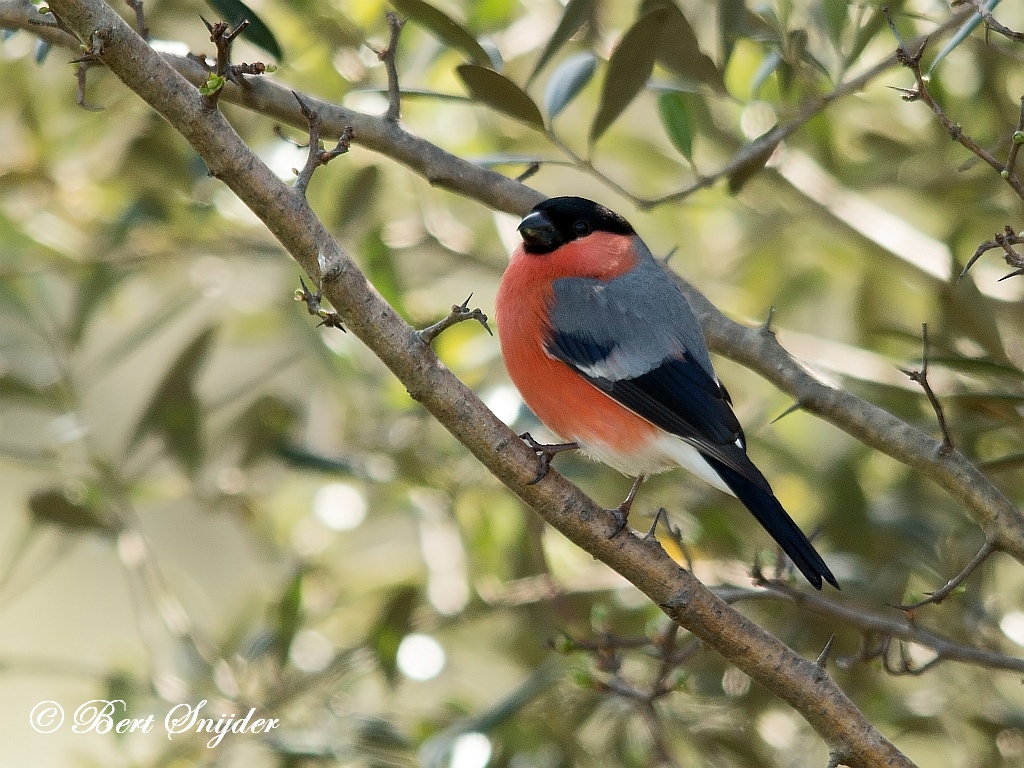
More photos at the bottom of this page:
The Eurasian Bullfinch was listed in 1758 by Linnaeus in the 10th edition of his Systema Naturae under the binomial name Loxia pyrrhula. The Latin word pyrrhula comes from the Greek purrhoulas meaning ‘worm eating bird’ that is mentioned by Aristotle. The Latin name for the species had been used by Swiss naturalist Conrad Gesner in his Historiae animalium of 1555.
The closest relative of the Bullfinches is genus Pinicola (Pine Grosbeak and Crimson-browed Finch).
The Azores Bullfinch (P. murina), previously regarded as a subspecies of the Eurasian Bullfinch, is now recognised as a distinct species.
The Bullfinch is a bulky bull-headed bird. The upper parts are grey; the flight feathers and short thick bill are black; as are the cap and face in adults (they are greyish-brown in juveniles), and the white rump and wing bars are striking in flight. The adult male has red underparts, but females and young birds have grey-buff underparts. It moulths between July and October, but males do not have the duller autumn plumage that is typical of some other finches. The song of this unobtrusive bird contains fluted whistles, and is often described as ‘mournful’.
This bird breeds across Europe and temperate Asia. It is mainly resident, but many northern birds migrate further south in the winter. Mixed woodland with some conifers is favoured for breeding, including parkland and gardens.
This species does not form large flocks outside the breeding season, and is usually seen as a pair or family group.
It builds its nest in a bush, (preferably more than four metres tall and wide), mature stands of scrub, or tree, laying four to seven eggs. It is peculiar among Passeriformes for having spermatozoa with a rounded head and a blunt acrosome.
The food is mainly seeds and buds of fruit trees, which can make it a pest in orchards. Ash and hawthorn are favoured in autumn and early winter. If wild bird cover is planted for it, kale, quinoa and millet are preferred, next to tall hedges or woodland.
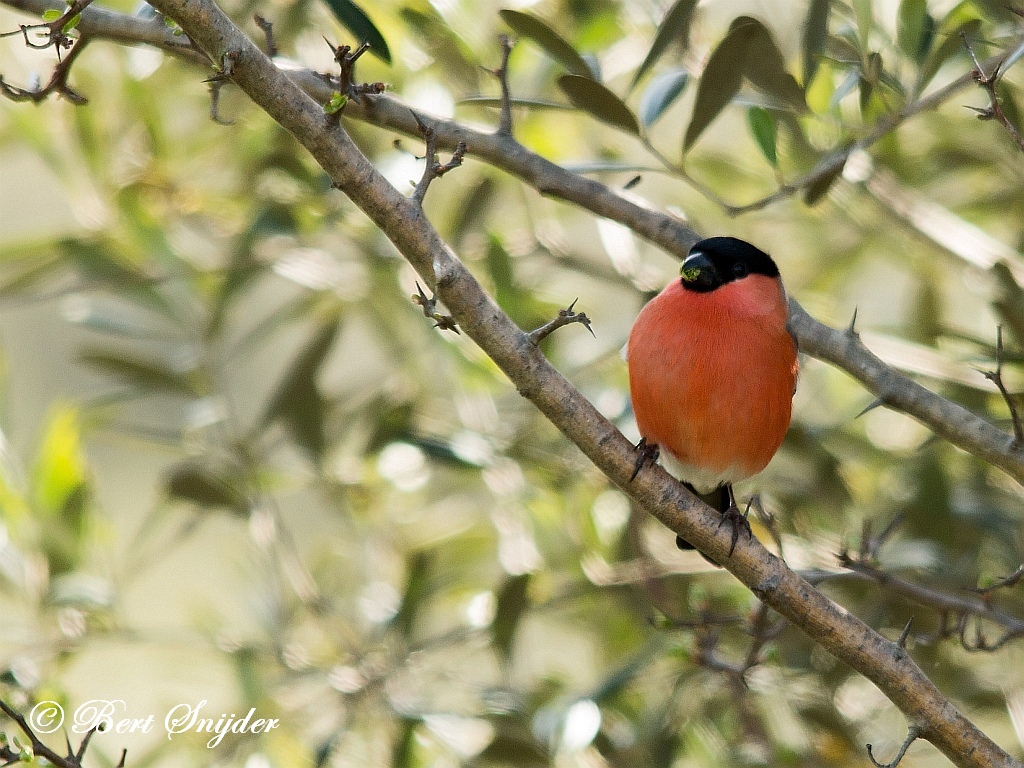
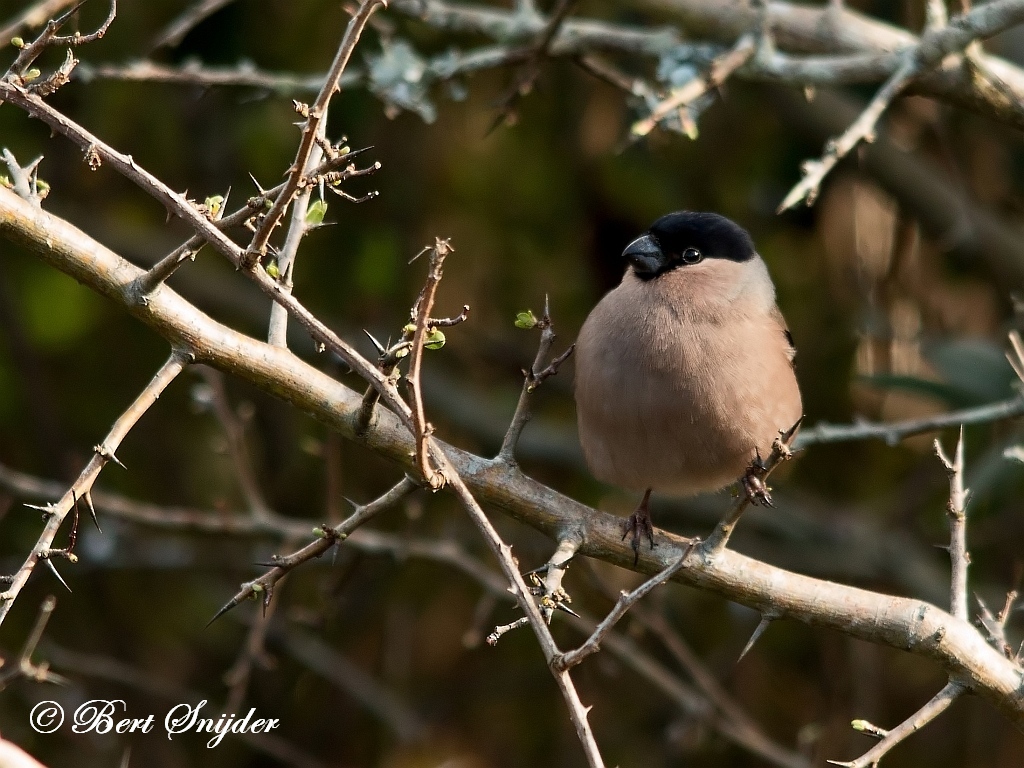
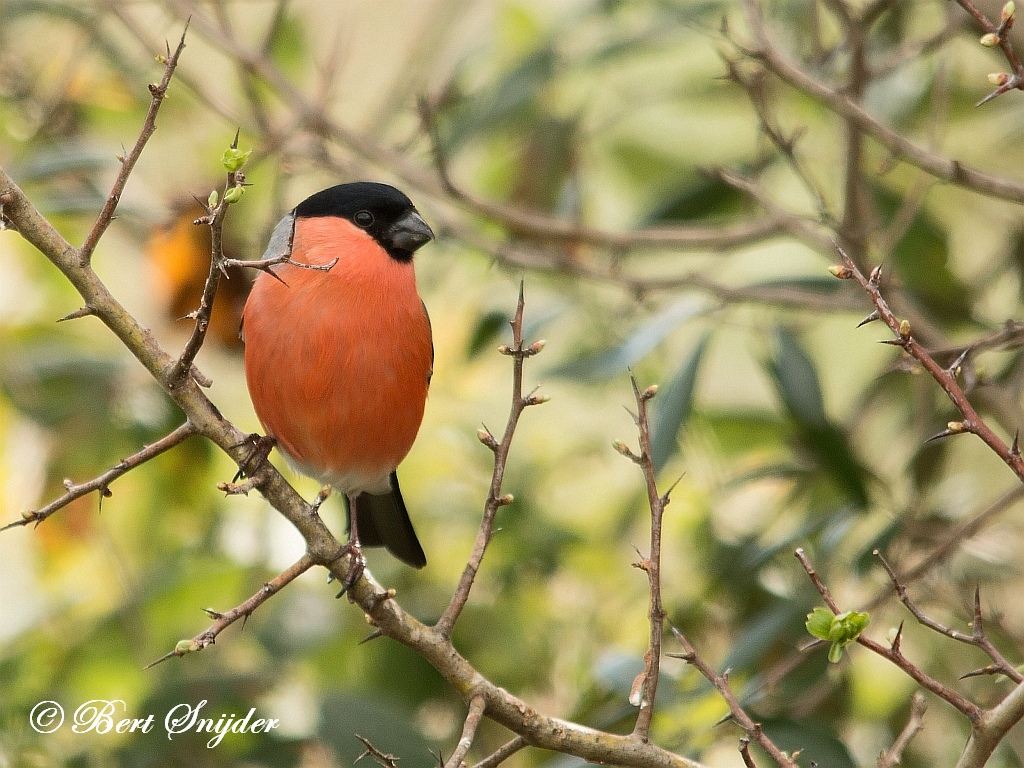
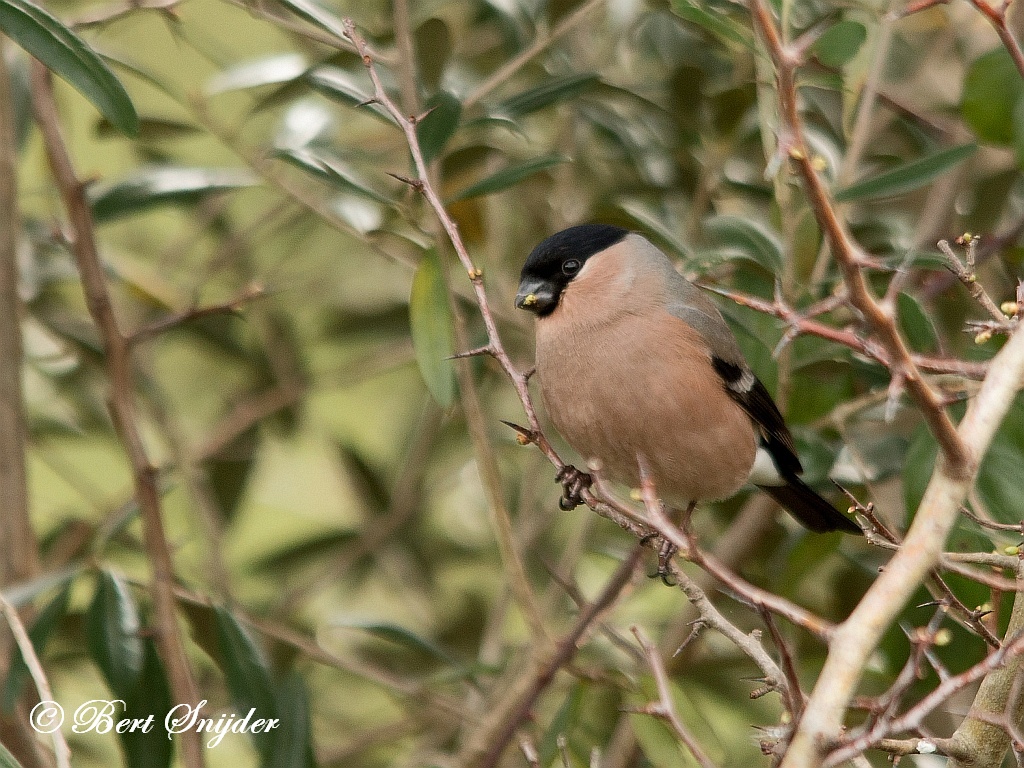
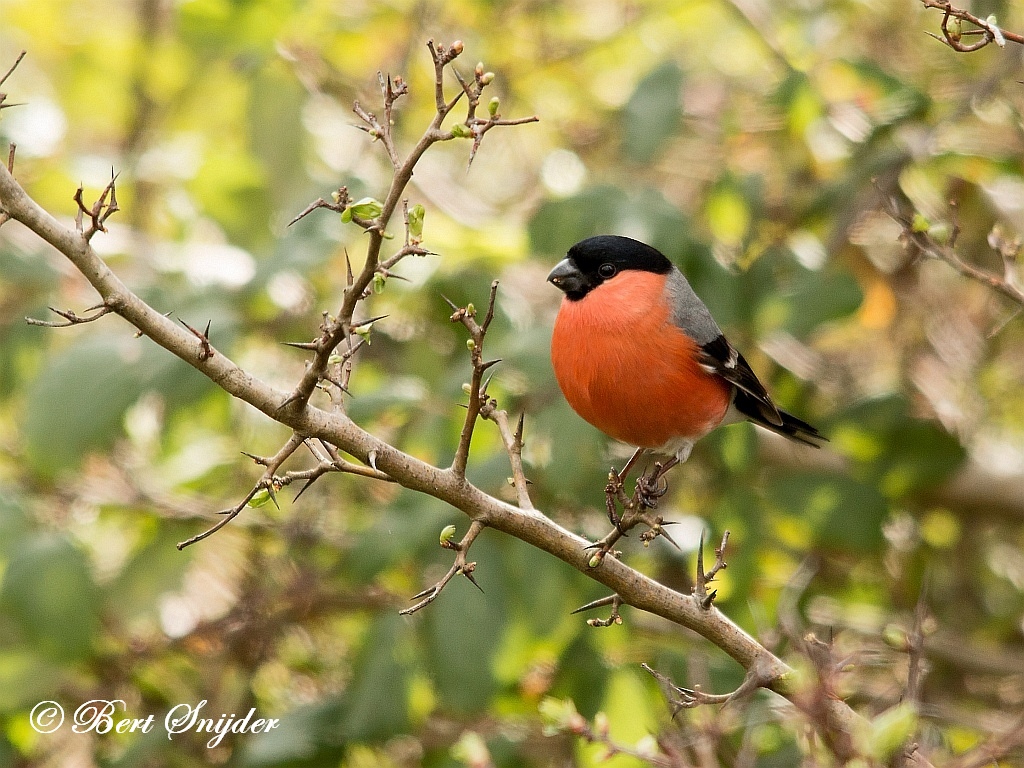
Other synonyms:
Asturian: Papu Collorau, Picabrotos
Bretons: Ar beufig, Beufig
Catalaans: Bec-tort, Pinsà borroner, pinsà borroner eurasiàtic
Catalan (Balears): Pinsà borroner
Valencian: Bec-tort
Tsjechisch: Hýl obecný
Welsh: Aderyn pensidan, Chwibanydd, Chwybanydd, Coch y berllan
Deens: Dompap
Duits: Azorengimpel, Dompfaff, Gimpel, Gimpel-pyrrhula
Emiliano-romagnolo: Bech in crous
Engels: Bullfinch, Cassin’s bullfinch, Common Bullfinch, Eurasian Bullfinch, North Eurasian Bullfinch, Northern Bullfinch
Esperanto: pirolo
Spaans: Camachuelo Comun, Camachuelo Común, Camachuelo picogrueso, Picotuerto Rojo
Spanish (Mexico): Picotuerto Rojo
Ests: Leevike
Baskisch: Gailupa, Pinsà borroner
Fins: Punatulkku, Punatulku
Faeröers: Prýðisígða
Frans: Bouvreuil pivoine
Iers (Gaëlisch): Corcán coille, Corcrán Coille, Gealún cuilinn
Schots (Gaëlisch): Corcan-Coille, Deargan-Choille
Galicisch: Cardeal, Pinsà borroner
Manx: Corkan keylley
Armeens: Sovorakan Khatzktik
IJslands: Dómpápi
Italiaans: Ciuffolotto, Ciuffolotto comune, Ciuffolotto comune eurasiatico
Japans: hime, uso, Uso-dori, Uso-hime
Korean (Transliteration): meo-t-jaengi, meot-jaengi
Cornish: Tynk whyban
Latijn: Pyrrhula cassini, Pyrrhula pyrrhula, Pyrrhula pyrrhula pyrrhula
Luxemburgs: Pillo
Limburgish: Kruusbek
Litouws: Juodagalve sniegena
Lets: Lielais svilpis, Parastais svilpis, Svilpis
Mongolian (Transliteration): egel zan, khavtgalj, zan
Maltees: Bugeddum
Nederlands: Goudvink, Noordse Goudvink
Noors: Dompap
Pools: gil, gil (zwyczajny), gil zwyczajny
Portugees: dom fafe, Dom-fafe
Romaans: prelat
Roemeens: Mugurar
Schots: Corcan-coille, Deargan-choille
Noord-Samisch: Ruksesruivil
Sloveens: kalin
Albanees: Kuqalashi çafkëzi
Servisch: zamovka, zimovka
Zweeds: Domherre
Travel Birdwatching Holiday Alentejo, Vacation Portugal for birders guided birdwatching Tours and Trips.